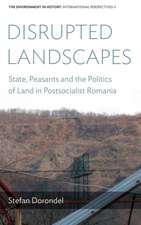The Political Theories of Risk Analysis: The International Library of Environmental, Agricultural and Food Ethics, cartea 4
Autor Nicholas P. Guehlstorfen Limba Engleză Paperback – 9 dec 2010
The Political Theories of Risk Analysis suggests that American environmental public policy is attempting to assess danger with an incomplete notion of utility, to eliminate the hazards of society with an inadequate contractual justification of political authority, and to publicly debate accepted levels of risk with an unfulfilled critical social theory. Because environmental risk analyses are incorrectly perceived as technically rational and socially apolitical, they result in practices that are muddled and misdirected. Making theoretical foundations explicit, however, could lead to improved practice. Public policy and administrative decisions regarding agricultural biotechnologies should and can function with more concern for democratic values.
The Political Theories of Risk Analysis is for environmental scientists, philosophers, public policy planners, applied ethicists, political scientists and environmentalists.
| Toate formatele și edițiile | Preț | Express |
|---|---|---|
| Paperback (1) | 636.12 lei 6-8 săpt. | |
| SPRINGER NETHERLANDS – 9 dec 2010 | 636.12 lei 6-8 săpt. | |
| Hardback (1) | 642.18 lei 6-8 săpt. | |
| SPRINGER NETHERLANDS – 8 dec 2004 | 642.18 lei 6-8 săpt. |
Din seria The International Library of Environmental, Agricultural and Food Ethics
- 15%
 Preț: 707.96 lei
Preț: 707.96 lei -
 Preț: 451.76 lei
Preț: 451.76 lei - 18%
 Preț: 731.10 lei
Preț: 731.10 lei - 18%
 Preț: 744.53 lei
Preț: 744.53 lei - 18%
 Preț: 899.87 lei
Preț: 899.87 lei - 18%
 Preț: 1831.27 lei
Preț: 1831.27 lei - 15%
 Preț: 644.82 lei
Preț: 644.82 lei - 15%
 Preț: 643.16 lei
Preț: 643.16 lei - 18%
 Preț: 947.04 lei
Preț: 947.04 lei - 18%
 Preț: 953.20 lei
Preț: 953.20 lei - 15%
 Preț: 646.62 lei
Preț: 646.62 lei - 15%
 Preț: 646.75 lei
Preț: 646.75 lei - 18%
 Preț: 1116.40 lei
Preț: 1116.40 lei - 15%
 Preț: 643.99 lei
Preț: 643.99 lei - 18%
 Preț: 953.65 lei
Preț: 953.65 lei - 15%
 Preț: 645.28 lei
Preț: 645.28 lei - 15%
 Preț: 637.28 lei
Preț: 637.28 lei - 18%
 Preț: 786.66 lei
Preț: 786.66 lei - 15%
 Preț: 644.30 lei
Preț: 644.30 lei -
 Preț: 398.74 lei
Preț: 398.74 lei - 18%
 Preț: 902.69 lei
Preț: 902.69 lei - 24%
 Preț: 697.64 lei
Preț: 697.64 lei -
 Preț: 388.52 lei
Preț: 388.52 lei - 20%
 Preț: 570.97 lei
Preț: 570.97 lei - 18%
 Preț: 784.61 lei
Preț: 784.61 lei - 15%
 Preț: 527.79 lei
Preț: 527.79 lei - 24%
 Preț: 635.52 lei
Preț: 635.52 lei - 15%
 Preț: 647.08 lei
Preț: 647.08 lei
Preț: 636.12 lei
Preț vechi: 748.38 lei
-15% Nou
Puncte Express: 954
Preț estimativ în valută:
121.73€ • 130.16$ • 101.49£
121.73€ • 130.16$ • 101.49£
Carte tipărită la comandă
Livrare economică 18 aprilie-02 mai
Preluare comenzi: 021 569.72.76
Specificații
ISBN-13: 9789048167388
ISBN-10: 9048167388
Pagini: 208
Ilustrații: VIII, 200 p.
Dimensiuni: 155 x 235 x 11 mm
Greutate: 0.3 kg
Ediția:Softcover reprint of hardcover 1st ed. 2004
Editura: SPRINGER NETHERLANDS
Colecția Springer
Seria The International Library of Environmental, Agricultural and Food Ethics
Locul publicării:Dordrecht, Netherlands
ISBN-10: 9048167388
Pagini: 208
Ilustrații: VIII, 200 p.
Dimensiuni: 155 x 235 x 11 mm
Greutate: 0.3 kg
Ediția:Softcover reprint of hardcover 1st ed. 2004
Editura: SPRINGER NETHERLANDS
Colecția Springer
Seria The International Library of Environmental, Agricultural and Food Ethics
Locul publicării:Dordrecht, Netherlands
Public țintă
ResearchCuprins
1:Risk, Rationality, and Liberalism.- 1. Introduction.- 2. Statement of the Research Problem.- 3. Environmental Policy and Analytical Framework.- 4. Case Study Design.- 5. Importance of the Research.- 6. Chapter Outline.- 2:The Technical Values in the Expert Judgment of Risk.- 1. Introduction.- 2. The Economic Effects of Rbst Use.- 3. Commercialisation of the Biological Sciences.- 4. Political Justifications for Food Biotechnology.- 5. Looking Forward.- 3:The Utilitarian Assessment.- 1. Introduction.- 2. Historical Debates Within Risk Assessments.- 3. Bentham and the Utilitarian Ethic in Risk Studies.- 4. Mill’s Liberal Reforms.- 5. The Risks of Mill’s Political Philosophy.- 6. Feminist Critiques of Mill’s Science.- 7. Conclusion.- 4:The Practice of Risk Management and the Theory of Social Contract.- 1. Introduction.- 2. Rawls’s Game of Risk.- 3. Locke’s Limited Government of Risk.- 4. Hobbes’s Risk Calculus.- 5. Risk Practice and Critics of Social Contract Theory.- 6. Possible Conclusions.- 5:A Theoretical Case for Reasonableness.- 1. Introduction.- 2. Political and Social Issues Related to Rbst.- 3. A Reasonable Middle Position.- 4. The Political Theory of Civil Disobedience.- 5. The Practice of Pluralist Democracy.- 6. Concluding Remarks.- 6:The Risks of Environmental Democracy.- 1. Introduction.- 2. Habermas’s Import.- 3. Marcuse’s Project.- 4. Beck’s Contribution.- 7:Liberal Communication Needed for Rational Practices.- 1. Conclusion.- 2. Contributions of the Study.- 3. Recommendations to Policy Scholars and Planners.- 4. Future Research in Risk Studies.- 5. Summary.- References.
Textul de pe ultima copertă
The purpose of this study is to question whether liberal political theories ought to inform the way policymakers and administrators analyze risk in proposed courses of environmental practice. In order to explore the relationship of liberal theory to rational practice in environmental policy, this project examines the risk analysis used to approve the genetically engineered bovine growth hormone in American agricultural policy.
The Political Theories of Risk Analysis suggests that American environmental public policy is attempting to assess danger with an incomplete notion of utility, to eliminate the hazards of society with an inadequate contractual justification of political authority, and to publicly debate accepted levels of risk with an unfulfilled critical social theory. Because environmental risk analyses are incorrectly perceived as technically rational and socially apolitical, they result in practices that are muddled and misdirected. Making theoretical foundations explicit, however, could lead to improved practice. Public policy and administrative decisions regarding agricultural biotechnologies should and can function with more concern for democratic values.
The Political Theories of Risk Analysis is for environmental scientists, philosophers, public policy planners, applied ethicists, political scientists and environmentalists.
The Political Theories of Risk Analysis suggests that American environmental public policy is attempting to assess danger with an incomplete notion of utility, to eliminate the hazards of society with an inadequate contractual justification of political authority, and to publicly debate accepted levels of risk with an unfulfilled critical social theory. Because environmental risk analyses are incorrectly perceived as technically rational and socially apolitical, they result in practices that are muddled and misdirected. Making theoretical foundations explicit, however, could lead to improved practice. Public policy and administrative decisions regarding agricultural biotechnologies should and can function with more concern for democratic values.
The Political Theories of Risk Analysis is for environmental scientists, philosophers, public policy planners, applied ethicists, political scientists and environmentalists.












